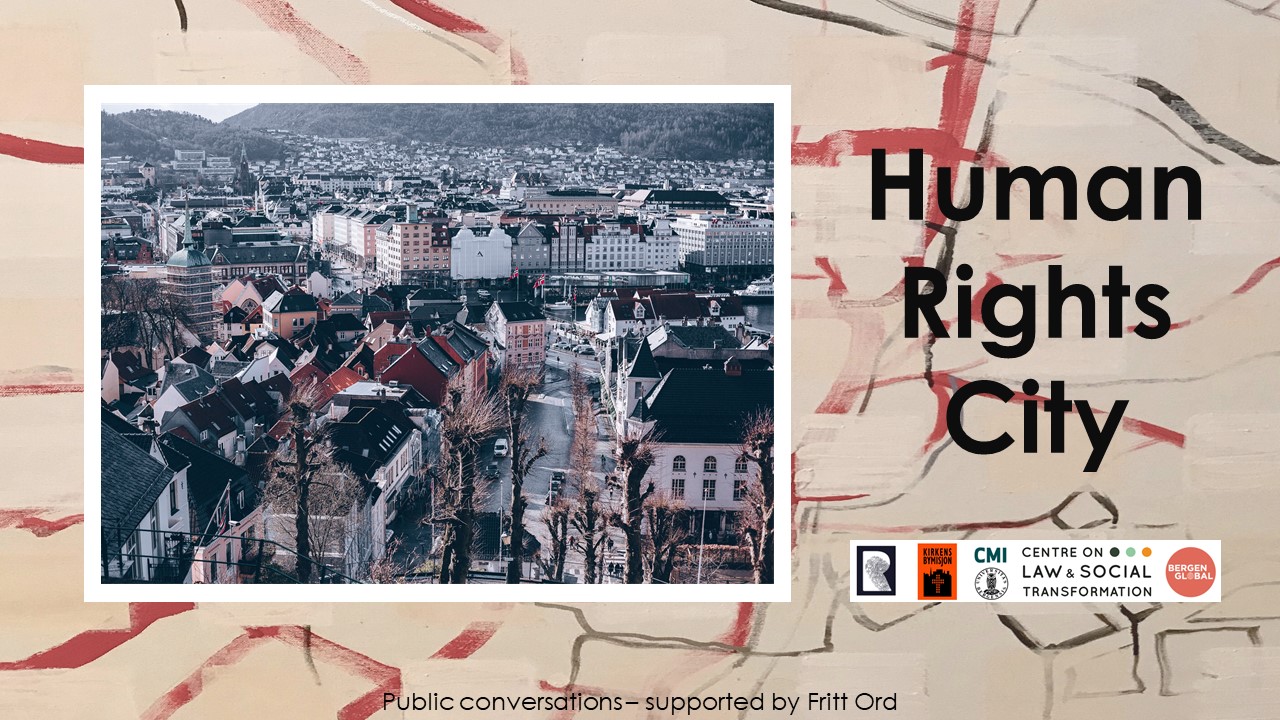


A joint initiative between the University of Bergen
and CMI – Chr. Michelsen Institute
Human Rights Cities explained – why do we need them?
Gerd Oberleitner (Graz), Ulrika Dagård (Lund), Hans Sakkers (Utrecht), Lubna Boby Jaffry (Bergen) in conversation with Jostein Kobbeltvedt (Rafto).

In June 2018 Bergen became a human rights city (HCR) joining more than forty other cities across the world. While there are many definitions of the concept of human rights cities, they are often defined as communities where everyone from ordinary citizens to policy-makers and local officials actively strive to protect and improve the lives of the city’s inhabitants.
However, the actions taken after becoming human rights cities are highly context specific and the lack of guidelines has led to different focus areas and individual experiences for the current HCRs.
As HCRs become an ever more popular concept this seminar aims to look at what human rights cities are and what they do. Why are cities choosing to become human rights cities and what are they accomplishing by doing so? While it is clear that HCRs are especially concerned with human rights, what differentiates them from other cities? Why do we need cities that specifically work on human rights? Do not all cities, certainly in western democracies, strive towards upholding human rights? What processes have the individual cities been part of, and what actions have been taken after the new title? And what are the consequences for the city and its people once they declare themselves an HCR?
Join this seminar in which we will hear from four European HCRs as they tell us about their experiences. We will hear from representatives from Graz, Austria, the first European HRC (Gerd Oberleitner,
UNESCO Chair in Human Rights and Human Security); Lund, Sweden (Ulrika Dagård, Strategist Socal Sustainability and Human Rights); Utrecht, Netherlands (Hans Sakkers) and Bergen, Norway (Lubna Boby Jaffry Comissioner for Work, Social Services and Housing). They will talk about their work as human rights cities and join in a conversation moderated by Jostein Kobbeltvedt from the Rafto Foundation on Human Rights.
The 10th of December is the UN Day of Human Rights, a perfect day to focus on the work cities are doing to promote human rights at the local level and to highlight the function of human rights cities.
Ulrika Dagård is a project manager and strategist at the city council office in the city of Lund. Her main responsibilities are to work with human rights and local democracy issues. In total, she has ten years of experience in working with democracy development, business development, community engagement, communication and human rights both at a strategic and operational level in Swedish cities and municipalities.
Lubna Jaffery is a member of the city government, and the Commissioner for Work, Social Services and Housing. Lubna Boby Jaffery has been a member of the City Council from 2015 to 2019, and for a period from 1999 to 2003. She has also been an adviser in the government apparatus and State Secretary in the Ministry of Culture. Lubna Boby worked as a senior adviser in the Directorate for Integration and Diversity until 2019 when she became a commissioner.
Gerd
Oberleitner is Professor of International Law and UNESCO Chair in Human Rights and Human Security at the University of Graz. He is Director of the European Training and Research Centre for Human Rights and Democracy at the University of Graz, which supports the human rights city Graz, and works with the UNESCO Centre for the Promotion of Human Rights at the Local and Regional Levels, established 2020 in Graz.
Hans Sakkers worked for two decades in different management positions for the city of Utrecht, including as head of International Affairs. He currently works as a strategist dealing with the translation of the Human Rights and the Sustainable Development Goals discourses into local practices. His ambition is to rethink the role of cities in the process of globalization, its challenges and the role of the UN-principles therein.
Photo by
Florencia Viadana
on
Unsplash

